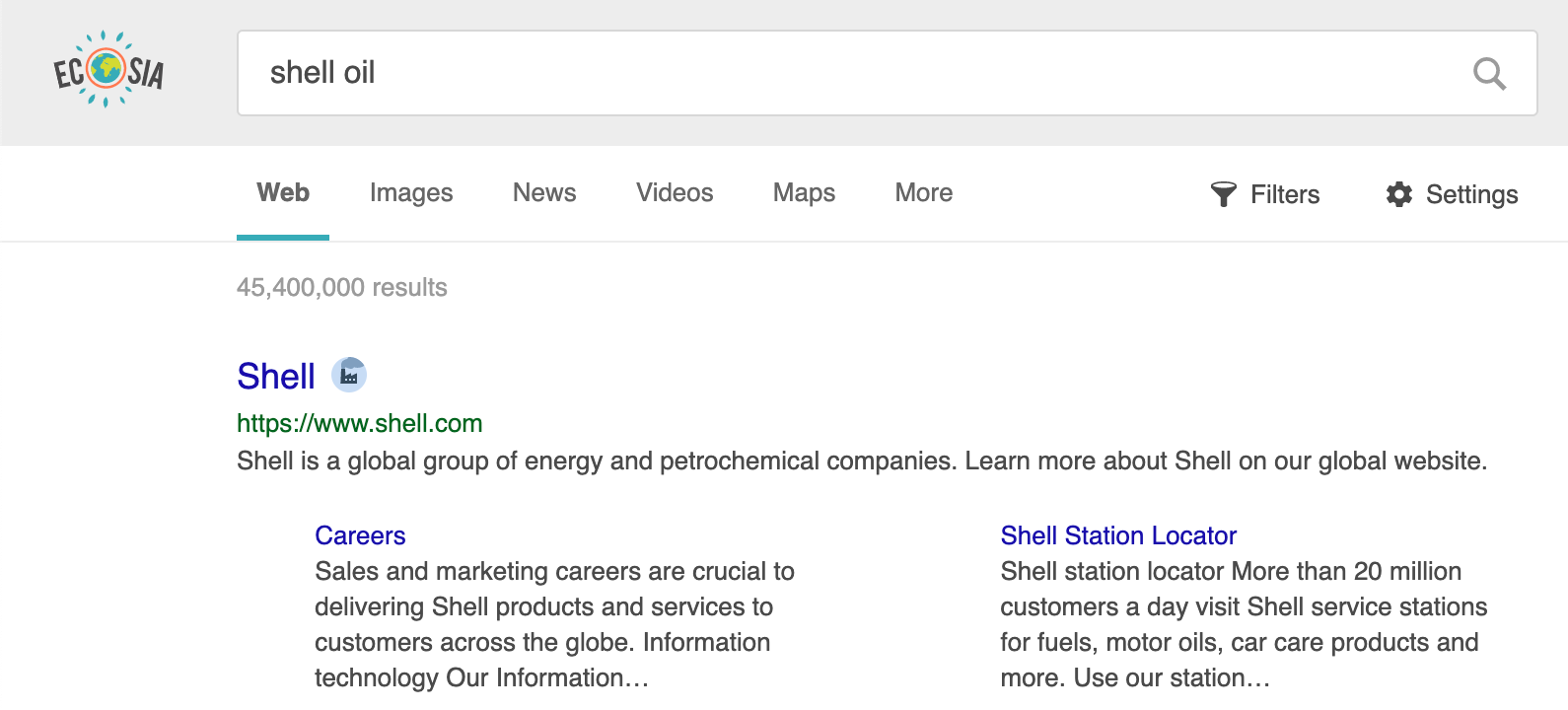The Guardian, in collaboration with the Climate Accountability Institute, has revealed that 20 fossil fuel companies have been at the center of the climate crisis. Ecosia will highlight these firms (along with several other culprits) with a fossil fuel plant icon:

Planet-friendly organizations, meanwhile, are highlighted with a green leaf.
We talked to Jonathan Watts, the Guardian’s global environment editor. He recently published an article revealing the 20 companies that are driving the climate emergency.
Ecosia: You revealed that only 20 companies are behind a third of all carbon emissions. What went through your mind when you made that discovery?
Jonathan Watts: I think it's horrifying that a third of all energy-related carbon emissions can be traced back to just 20 companies. It's horrifying because you see how the problem is concentrated in one area and how much some of these corporations knew fifty years or more ago.
And yet, at the same time, it's encouraging, because it reveals these pressure points, the source of the problem. Dealing with the problem at source, dealing with 20 companies, is surely more efficient than saying that all the world's 7+ billion people must do something. It's like trying to deal with a fire: you can never put out a fire unless you get to its source. And I think in this case the fire is the climate crisis and it's these 20 companies that are right there at the center of it.
How did you figure out who should be on this list?
We worked with an academic, Richard Heede, of the US-based Climate Accountability Institute. This institute does an incredible job in trying to tally which emissions originated where. And that's no easy feat. Richard Heede has been looking at this for a very long time, and he has a big team, many of them volunteers. They have to trawl through libraries around the world to try to find old company prospectuses, to see what companies said and did what in which year in the past. So it's an extraordinarily complex exercise involving many, many data points. Heede has dedicated himself to this and has come up with this unique list which recalibrates the responsibility for the climate crisis. It doesn't mean that consumers and end users are not responsible – we're all responsible. But it means that the onus should be more on the companies that have profited the most and known about the problem the longest.
Do the companies on the list have much in common?
I think you can separate the companies into two main groups, and some sub-groups. Of the top 20, 17 of them are oil and gas companies. Three of them are more involved in coal. So the type of fuel is one dividing line. In the petrochemical sector, you first have the private companies from the capitalist West. There the big historical culprits are Chevron and ExxonMobil of the USA, Shell of the Netherlands, and BP of the UK. Historically, they have a huge responsibility. And then – and rising the fastest at the moment – are the nationally owned oil and gas corporations. So there you've got companies like Saudi Aramco, the Iranian Oil Company, oil companies in Venezuela, Kuwait, and elsewhere. They operate in a different way.
In a sense, it's easier to put pressure on the private companies, because they tend to operate in democratic countries, so you can pressure them through the free media, through shareholders, and through the political system. It's harder to put pressure on the nationally owned companies, because they don't tend to operate in democracies, and with far less transparency, especially in places like China or Russia, where it's harder to use the levers that work on the likes of BP and Shell.
When we looked forward we found a whole new set of players who are operating in shale gas and shale oil. Particularly in the US, and particularly in the Permian Basin in Texas. This will be the area in the world that will see the fasted growth in the next 10 years. By some calculations, Texas oil production will be bigger than all of Saudi Arabia's by 2030.
You published this information in The Guardian, and we'll publish it on our search engine. Why should we all know about this?
I think it's important that people talk about it, that they don't just think that something terrible is happening with nothing they can do. Yes, it's important to know that something terrible is happening – it's important to be concerned, fearful even. But then it's important not just to panic and run away, but to think about what can be done.
And I think that focussing on the politics, focussing on particular companies and particular parts of the financial, legal, and media sectors, is going to be a much more effective way of dealing with the climate crisis than only blaming yourself. Deciding to eat less meat and to fly less is important and useful, but those things will be completely futile unless we have political change causing transformations in the energy sector, the financial sector, and other parts of society.
